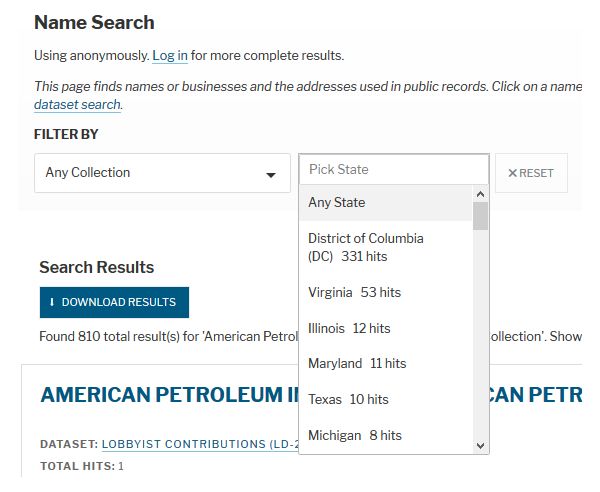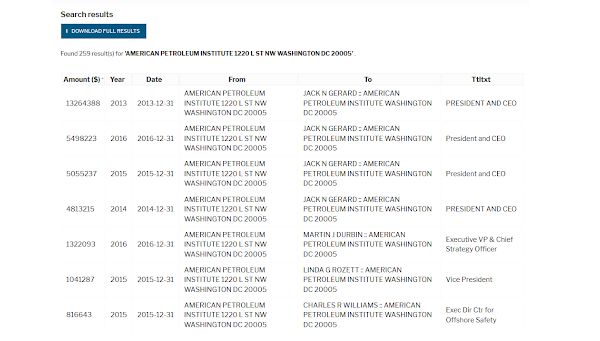SEJournal Online is the digital news magazine of the Society of Environmental Journalists. Learn more about SEJournal Online, including submission, subscription and advertising information.
 |
| The Accountability Project database allows searches of hundreds of public data sets that could be used to look up money in politics, such as contributions from Hollywood figures like actor/climate change activist Mark Ruffalo, shown above in the recent eco-thriller “Dark Waters.” Photo: Focus Features. Click to enlarge. |
Reporter’s Toolbox: ‘TAP’ Into One-Stop Shop for Public Data
By Jennifer LaFleur and Cole Goins
Environmental stories about conflicts of interest, influence and accountability often require journalists to search across many different data sets. But those are rarely in the same place.
So the Investigative Reporting Workshop has now created The Accountability Project, or TAP, to make much of that data available in one search.
TAP connects hundreds of public data sets from federal, state and local government sources. So far, we’ve uploaded hundreds of databases, accounting for more than 530 million records — including data related to money in politics and much more.
While commercial research and backgrounding tools can be prohibitively expensive for small newsrooms, TAP offers a free, powerful and easy way for any journalist to query multiple datasets at once.
Based on feedback from SEJ members,
we are in the process of
adding federal and state contracts.
We started with data on money in politics and have added data on nonprofits, voters, business licensees and public employees. And based on feedback from Society of Environmental Journalists’ members, we are in the process of adding federal and state contracts.
We obtained data through public records requests and from government websites. Every database is reviewed, standardized and indexed by someone on the team. To show you what we did, each dataset includes our processing notes.
TAP is searchable by name, organization and address. Nonprofits also are searchable by their federal ID numbers. And all of the data is free to search. It just requires a password for access to some datasets. You can create a login here.
How TAP can help your reporting
Newsroom resources are limited, deadlines are tighter and accountability journalism is needed more than ever. Our goal with TAP is to give newsrooms a resource that can help generate stories that hold powerful people, companies and institutions accountable.
We have lots of ideas about how to use TAP for environmental stories (and would love to hear yours).
Here are a few possible approaches:
- Search for “water board” to get all the hits involving political influence, nonprofit water boards and even a few nonprofit revocations.
- Search for “Andrew Wheeler” to show the EPA administrator’s past campaign spending, along with his role as vice president of the Washington Coal Club.
- Check out Hollywood connections. For instance, search to show the contributions and nonprofit involvement of actor and climate change activist Mark Ruffalo, who recently starred in the eco-thriller “Dark Waters.”
We want to support your stories. We're looking for story pitches that draw from data and are offering financial stipends, data support and co-publishing and promotion for ideas that we select. You can learn more and send us your story pitch here.
A TAP walkthrough
To show you how TAP works, we’ll take you on a test drive using the American Petroleum Institute. From the front page, type a name, address or both and click SEARCH:
 |
When you hit SEARCH, you’ll get the results across all databases. Use the drop-down menus to learn more about the results.
If you click the drop-down for FILTER BY | ANY COLLECTION, you’ll see the number of results by category.
 |
PICK STATE shows you the states with hits, in descending order by the most hits.
 |
Let’s choose Nonprofits from the collection list.
 |
The first result is from the Nonprofit Directors and Employees dataset. Drill down further by clicking on the name.
If you click on the amount, you can list the pay in descending order. You can narrow further by date or by amount ranges.
 |
From this page, we could do a search on another nonprofit category. Searching NONPROFIT GRANTS, for example, would yield all grants to or from the AMERICAN PETROLEUM INSTITUTE.
 |
The search results show a limited number of fields, but if you want to see everything in the records, click DOWNLOAD FULL RESULTS to get a csv file with all fields in the database.
 |
What’s next
We’ll continue to expand into other categories with data that focuses on people, organizations and their locations.
We're especially interested in hearing from reporters about data that would be useful for us to include, or whether there are particular datasets related to the environment that you'd like to see.
Learn more about what we're looking for and let us know here.
By late spring, we will be adding a feature to let users run SQL queries against the data.
We expect to add new features to the site, including geographical searches and the ability for users to run their own data against what is on the site.
We're also planning to conduct more user-experience research to better understand how people use the site and how we can improve its functionality.
If you have ideas or feedback, please drop us a line: accountability@irworkshop.org.
Jennifer LaFleur is project manager and data editor for The Accountability Project, while Cole Goins is its engagement lead. The Washington, D.C.-based LaFleur joined the Investigative Reporting Workshop as data editor in 2017 and was previously a senior editor for Reveal from The Center for Investigative Reporting. She is the former director of computer-assisted reporting at ProPublica and has held similar roles at The Dallas Morning News and other newspapers. She has won awards for coverage of disability, legal and open-government issues. She was the first training director for Investigative Reporters and Editors and currently serves on IRE’s Board of Directors. Goins, based in Berkeley, Calif., has spent more than a decade working with nonprofit investigative journalism organizations to develop audience and engagement strategies and has led workshops, trainings and community events across the country with a range of partners, including the American Press Institute, The New School's Journalism + Design program and the Poynter Institute.
* From the weekly news magazine SEJournal Online, Vol. 5, No. 9. Content from each new issue of SEJournal Online is available to the public via the SEJournal Online main page. Subscribe to the e-newsletter here. And see past issues of the SEJournal archived here.














 Advertisement
Advertisement 



